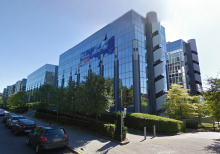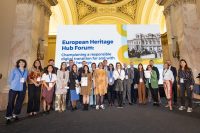-
Join the
Digital Meets Culture
Newsletter! -
Join the
Digital Meets Culture
Open Newsroom! If you have interesting news and events to point out in the field of digital cultural heritage, we are waiting for your contribution.
If you have interesting news and events to point out in the field of digital cultural heritage, we are waiting for your contribution.
-
Free text
-
-
Upcoming events
-
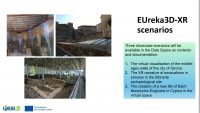 The kick-off for the new project, continuation of the successful EUreka3D, is organized in Pisa by coordinator Photoconsoritum on 26-27 February 2025
The kick-off for the new project, continuation of the successful EUreka3D, is organized in Pisa by coordinator Photoconsoritum on 26-27 February 2025EUreka3D-XR – European Union’s REKonstructed content in 3D to produce XR experiences EUreka3D-XR is the continuation project of EUreka3D, funded by the Digital Europe Programme of the European Union, to develop innovative re-use scenarios and tools that enable the creation … Continue reading →
 Siena (Italy), 8-13 September 2025
Siena (Italy), 8-13 September 2025 As the leading global event on digital technology for documenting, conserving, and sharing heritage—from landscapes and monuments to museums, collections, and intangible traditions—the Digital Heritage International Congress offers a unified stage for major world conferences, workshops, and exhibitions. … Continue reading →
Author Archives: Claudia Pierotti
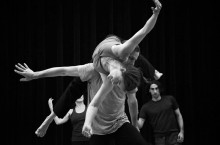
“Memory ^ sentiment ^ body ^ space ^object – Dialogues across and between dance and art” is an interdisciplinary symposium that emerged from Body Space Object Roundtables at the School of Art and Design at Coventry University. It aims to consider how performative and material practices have articulated the embodied nature of memory and sentiment in relation to objects and space. Contributions are invited, registration is open! Continue reading

The purpose of this special issue is to bring together interdisciplinary approaches that focus on the application of innovative as well as existing data matching, fusion and mining and knowledge discovery and management techniques to data derived from all areas of Humanistic Sciences. Continue reading

DCDC15 (DCDC as Discovering Collections Discovering Communities), being held at Greater Manchester on 12-13 October 2015, will look at the varied and innovative ways in which archives, museums, libraries and academia can engage with audiences in the digital age, for a more appealing user experience, the enrichment of heritage collections and new collaboration and business opportunities. Continue reading
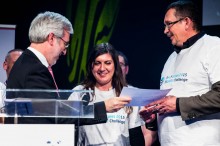
On 25-26 March 2015, in Brussels, the Net Futures 2015 conference was held, gathering more than 1000 people with the aim to maximise the competitiveness of the European technology industry. The event formed an interconnected community involving companies, organisations and people in Research & Innovation, Market Validation & Living Lab Research, Business Development, Entrepreneurship & Enterprise Strategy, Policy Making. It is firm belieg of the organisers that by bridging the gaps between these communities, innovations will more easily and effectively find their way to the market. Continue reading
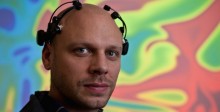
Could neurophysiological and BCI (Brain Computer Interface) tools already control our mind? And could we vice versa already build an individual virtual reality using BCI systems, able to fulfill all users’ desires? And what exactly users actually desire from them? These will be the frame questions of the Friday 24 symposium with dr Aleksander Väljamäe (NGM lab), Pavel Smetana (CIANT) and artist Ivor Diosi. Continue reading
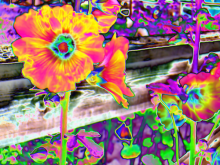
Last month EBN welcomed ADDICT – Creative Industries Portugal, the Creative Industries Agency in Portugal. ADDICT is a non-profit association created in 2008. It currently gathers around 100 members and is recognised by the Ministry for Economy as the coordinator of the Creative Industries Cluster in Portugal. ADDICT’s mission is to foster a favourable environment for culture and creative economy to thrive, advocating the sector interests and acting as platform for knowledge and innovation. Continue reading
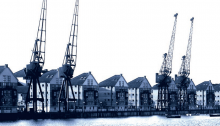
The report “Getting cultural heritage to work for Europe”, by the Expert Group on Cultural Heritage established under the Horizon 2020 Work Programme 2014, provides the rationale for setting a renewed European Research & Innovation policy agenda on cultural heritage. It outlines the general framework about cultural heritage in Europe and the contribution it can make towards smarter, more inclusive and more sustainable development. The report further describes recommendable actions, drawing upon successful cases where cultural heritage has been a positive driver for sustainable development. Continue reading
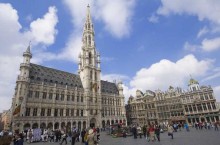
On 26 March 2015 PREFORMA underwent its first review, obtaining an excellent evaluation. The EC reviewers gave the consortium useful recommendations to improve the networking activities and to start planning the testing phase. Continue reading

Ultraorbism was an interactive distributed action between two networked connected spaces in two cities: Barcelona and Falmouth. The story was a linear interpretation of the first of the two books of True Story by Lucian of Samosata (a Syrian writer who lived in the second century AD), who tells an impossible journey on which everything is invented, with references to the mythology and literature of the era. Ultraorbism, a project directed by Marcel•lí Antúnez Roca, is part of the European project SPECIFI and case study of the RICHES European project’s research area. Continue reading


